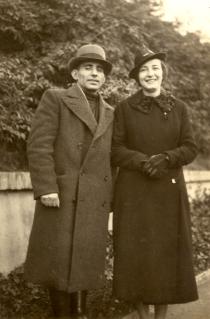Agi Sofferova with her father and two siblings in Mukachevo
On the left is Ibi, as we called my sister Helena (Jocker, nee Kahan), beside her is my father Bence Kahan, then I, and standing beside me is my brother Joe. He lived in England after the war. How old might I be here? About twelve. I was born in 1923, so this photo was taken in 1936.
This was taken in Mukachevo, in our yard. In the front there was a big yard, a well, and these small little houses. That's where our neighbors lived. The big building behind us belongs to our neighbors. Beside it is are toilets, a latrine, which belonged only to us. I didn't grow up with a bathroom. I always said: 'I didn't grow up with a bathroom, and I couldn't be without one.' In the back there was a yard, a couple of trees, plum trees and one walnut tree, and a bit of space for a garden. There we grew vegetables: cucumbers, radishes, potatoes.
My father was named Bence, which is a Hungarian name, in Hebrew it's ben Zion, the Son of Zion. He was born in Máramoros Sziget. Today he'd be around 130 years old. When I was born, my mother was already over 40, and my father must have been around 50, so he was born around the year 1873. While he was still in Máramoros Sziget, he attended elementary school, back then it was a poor region, and they couldn't afford an education. Neither time-wise nor money-wise. His mother tongue was perhaps Yiddish, but he also spoke Hungarian, Hungarian was spoken in those parts. Later he left Máramoros Sziget for Mukachevo, and there he married my mother, Miriam. I don't know how they met.
My father observed Jewish traditions, he celebrated everything, attended synagogue, or more often went to prayer halls. He attended both morning and evening prayers, that was the custom in Mukachevo. Kashrut, as it's called, was observed at home. We had three sets of dishes. The Passover ones were kept up in the attic, and always at Easter it had to be brought down, they were decorated ceramic ones. Seder was always a big celebration, because the family would gather. You know, the kids that had already gone out into the wide world would return. That was always nice. Even Saturday was observed, and strictly. They wouldn't cook, wouldn't do anything.
My brother Jan was the third oldest child. He was born in Mukachevo in 1905. He lived in Mukachevo. During the war he was in several concentration camps, because he fought in Spain. He went there in 1938 as a volunteer. He was in a prison in France, there they helped him get home illegally to Mukachevo. It was like a miracle, you know, there was an underground movement there, too. He got home, but he wasn't there for even an hour or two, and right away they came for him. They took him away to a concentration camp in Hungary. From there he went to Auschwitz. So he went through a lot, but returned and stayed in Mukachevo.
The sibling closest in age to me is Helena, who we call Ibi. She was born in 1919. Before the war she studied to be a teacher in Miskolce, and then taught in Uzhorod. She left for the concentration camp from Uzhorod, along with her students. She's still alive, in the Canadian city of Halifax; she's older than I, but is a chipper gal. After the war she married that Emil Jocker, the husband of her sister Ruzena who had died during the war. They lived in Znojmo, but right before the revolution [before 1989] they wandered off to Canada, where their daughter Jana, a doctor, had gotten married, and their son Pavel had also escaped to there.




















